Issa Tchiroma Bakary : “Troublemakers Will Be Held Liable For Their Acts”
- Par René Emmanuel Sadi
- 18 janv. 2017 11:16
- 0 Likes
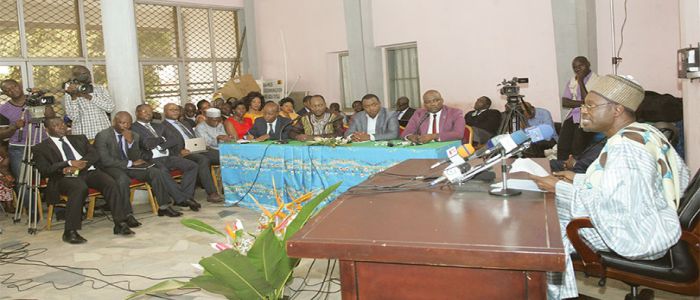
Following is the update of the Minister of Communication, Issa Tchiroma Bakary on the socio-political situation in some localities of the North West and South West Regions given during a press conference on January 17, 2017.
“Distinguished Journalists,
I wish you all a warm welcome to this press conference to which I have invited you, which will exchange on the socio-political situation prevailing in certain localities in the North West and South West Regions, following the concerns raised by some Lawyers and Teachers having English as first language of expression.
As you are already aware, in order to review these claims and to seek for the most appropriate solutions, the Prime Minister, Head of Government, was enjoined by His Excellency the President of the Republic to set up a frameworks for dialogue with the various stakeholders on the concerns raised, so as to examine their relevance and propose solutions to the decision-making bodies that could be envisaged.
With regard to the concerns raised by teachers, two committees were set up by the Prime Minister, Head of Government.
With regard to concerns raised by Lawyers, another committee was set up for the same purposes by the Prime Minister, Head of Government.
With regard to the case of teachers, I would like to recall that on November 6, 2016, six professional trade unions of English-speaking teachers announced the call for strike to parents, teachers, pupils and students, which was to take effect on November 21, 2016 and which included a total of 11 items of protest on the basis of which the proposed strike was to be undertaken.
A first meeting of negotiations was held at the initiative of the Government in the city of Bamenda.
Given that no compromise was reached in this first meeting, the Government again went to meet the protesters, and it was the Prime Minister, Head of Government, who personally led the negotiations, going to Bamenda on the November 25 and 26, 2016.
The trade unions had then taken the commitment to suspend the strike call in the event where at least one of the 11 concerns raised in their strike notice of 6 November 2016 would have received a favorable reply from the Government no later than 30 November 2016.
In the meantime, the Government, in accordance with its commitments and in keeping with its willingness to work for a rapid return to normal, favourably responded to not only one but to two demands included in the grievances’ register of trade unions, notably items 5 and 9 of their strike notice.
It was against this backdrop that, with regard to item 5, which referred to the transfer of teachers having French as their first language with an approximate command of English to teach in English-speaking schools, that the Head of State ordered the special recruitment of 1,000 young teachers with a perfect command of English to lecture the required courses in English.
In addition to this favorable response, the Government added another element to item 9 of the aforementioned concerns, which focused on the limited financial capacity of lay and denominational private institutions to meet the objectives of ensuring an optimal training of their learners.
As a response, the Head of State ordered the establishment of a special subsidy of CFA F two billion to lay and confessional private schools.
Despite this respect of commitments with regard to both their content, form and procedures by the Government, the other party refused to call off the strike, contrary to what had been agreed upon, on the motive that the claims which were answered by the Government were not the major ones.
Nevertheless, the Government undertook to reopen negotiations by convening a session of the Ad hoc committee on last December 27 in Bamenda.
And it was during this session that the trade unions tabled two conditions for the resumption of works, the first condition was to increase the number of representatives of the South-West Region in the constitution of the Committee and secondly, the unconditional release of all those arrested during the violent protests.
The Committee, after stating that it was not competent to address the second condition, especially the release of individuals who are in the hands of the judiciary, the six trade unions walked out of the negotiations room.
In order to continue dialogue and to seek a concerted solution to the concerns raised by the trade unions, the Government returned to the table of negotiations through the Ad Hoc Committee set up for this purpose on 12 and 13 January 2017 in Bamenda.
During this session, the trade unions raised their concerns from 11 to 18 then from 18 to 21.
Each of these items was then subjected to a concerted, methodical and rigorous analysis.
This is how at the end of this session, while it was expected that the trade unionists would sign the communiqué to call off the strike, as wished by all the representatives of parents of pupils and promoters of school institutions present at the negotiations, the trade unionists instead asked for a period of reflection before taking any decision. They were naturally granted the time to reflect, and came then back after about thirty minutes and finally refused to allow classes to resume.
And it was precisely at this moment that they tabled two prerequisites conditioning the calling off of the strike action: first, the unconditional release of all those arrested in connection with the strike within the framework of Police and law enforcement operations following the organized disorder and violence on the public highway and, secondly, the setting up of a federation as a form of State that should henceforth be made up of two federated States.
After informing them on the one hand, that the first prerequisite was under the competence of the judiciary, and that many of those arrested had already been released and that, on the other hand, with regard to the return to State federalism, the Head of State had already made it clear that the form of the State was non-negotiable, the Chairman of the ad hoc committee ended up the meeting.
In an official statement issued on Monday, 16 January 2017, the Chairman of the Ad Hoc Committee, in the person of the Minister, Director of Cabinet of the Prime Minister, Head of Government, recalled that the Government had already implemented many solutions arising from the claims made by the trade unions of the Cameroonian education system, including the special recruitment of 1,000 bilingual teachers in mathematics, science, technology and French subjects, the ongoing integration of the first wave of Grade I primary school teachers and secondary school teachers, the granting of an additional allocation of CFAF 2 billion in the form of public grants for the 2016/2017 school year to private primary and secondary schools, the organization in 2017 of the National Forum on Education, the redeployment of teachers of the two educational sub-systems.
He also indicated that the recommendations made on all other technical issues had already been transmitted to the Prime Minister, Head of Government, and that it was therefore necessary to consider the mission of the Inter-ministerial meeting under his chairmanship as completed.
With regard to the demands made by Lawyers, the constitutional framework for dialogue led by the Minister Delegate to the Minister of State, Minister of Justice, Keeper of the Seals, and mostly constituted by Lawyers, a total of 12 out of the 15 members met in Yaoundé on 27 and 28 December 2016.
The issues raised were:
- the redeployment of the judicial staff according to the particularities between the Civil Law and the Common Law;
- the redeployment of the Judicial Police Officers and the Court Registrars who do not master English;
- the creation of a Special Division of Common Law within the Supreme Court to hear appeals from jurisdictions in the North West and South West Regions;
- the creation of a Common Law Division at ENAM, and pending a more complete medium-term solution, the short-term reactivation of the English Law Section instituted by the Decree of 7 December 1964 establishing a Judicial Section at ENAM and the Decree of 20 October 1965 on the organization of the Judicial Division of ENAM;
On the issue of the unconditional release of all those arrested in connection with protest in the North West and South West Regions, the response of the Government was not in favor of those who advocates for such cases, and they preferred to quit the room.
Distinguished Journalists,
Everyone can therefore appreciate, in the light of what I have just described in the conduct of the dialogue process initiated by the Government, the level of constructive commitment and citizenship duty of one another among the interlocutors of the Government
Permit me to make a flashback on the major lines of the Head of State's address to the Nation on December 31, 2016 when he addressed this issue.
While reminding on this occasion that political and trade union liberties have for long been effective in our country but, just like any rule of law, these liberties are guaranteed and governed by our rules and regulations, the President of the Republic stated that each citizen has the right to express his or her opinion on any aspect of national life, including through duly declared peaceful strike action.
The Head of State went further to say that this is, and I quote, "a fundamental civil right as desired by the Cameroonian people given that it is enshrined in the Constitution", end of quote.
In this context – and the President of the Republic emphatically affirmed it –, lasting solutions to problems can be found only through peaceful dialogue. However, nothing can ever justify violence or any form of atrocity, a confrontational attitude against the authorities, or verbal escalation.
It was in this regard that the Head of State stated, and I quote him:
" We should therefore listen to each other. We should remain open to constructive ideas, to the exclusion, however, of those that would affect the form of our State. (...) We are willing to move in the footsteps and spirit of the architects of Reunification, and put in place a national entity which will be tasked with proposing solutions aimed at maintaining peace, consolidating our country’s unity and strengthening our resolve, and our day-to-day experiences of LIVING TOGETHER. And this should be done in strict compliance with our Constitution and our Institutions. Do I need to repeat this? CAMEROON IS ONE AND INDIVISIBLE! It shall so remain", end of quote.
The Head of State has affirmed without any ambiguity that the unitary form of the State is intangible and Cameroon is one and ...
Cet article complet est réservé aux abonnés
Déjà abonné ? Identifiez-vous >
Accédez en illimité à Cameroon Tribune Digital à partir de 26250 FCFA
Je M'abonne1 minute suffit pour vous abonner à Cameroon Tribune Digital !
- Votre numéro spécial cameroon-tribune en version numérique
- Des encarts
- Des appels d'offres exclusives
- D'avant-première (accès 24h avant la publication)
- Des éditions consultables sur tous supports (smartphone, tablettes, PC)






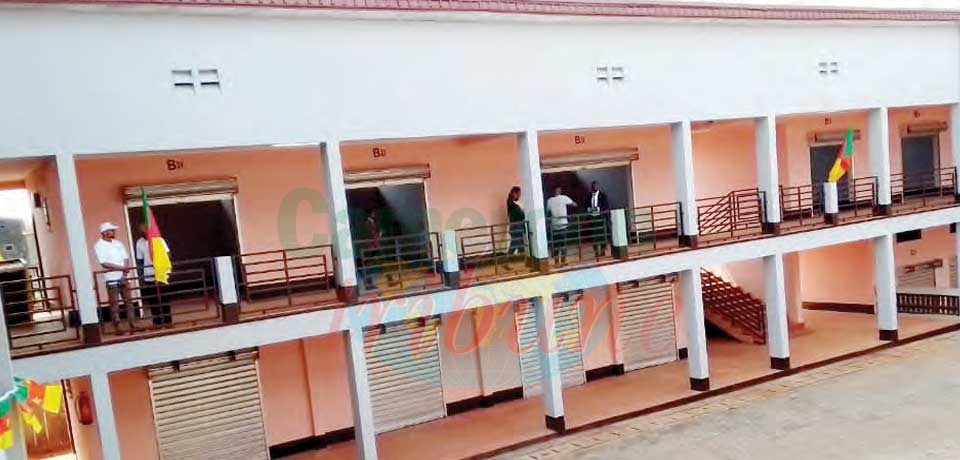
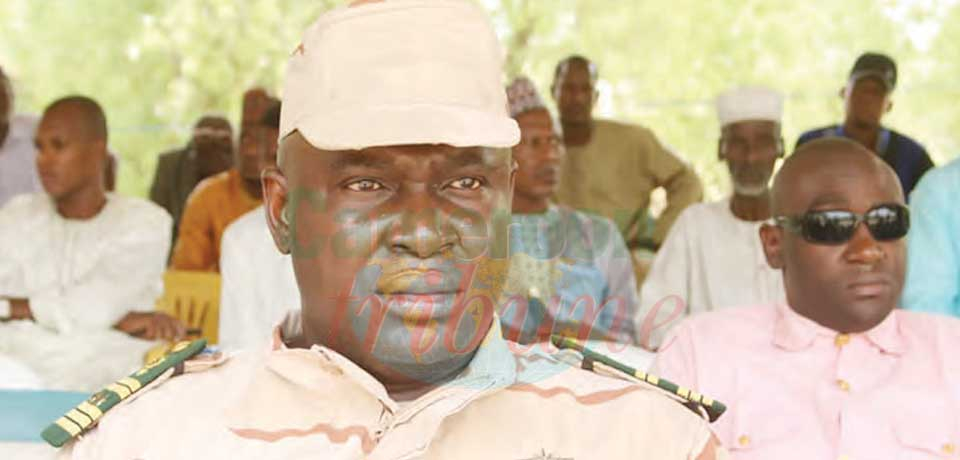
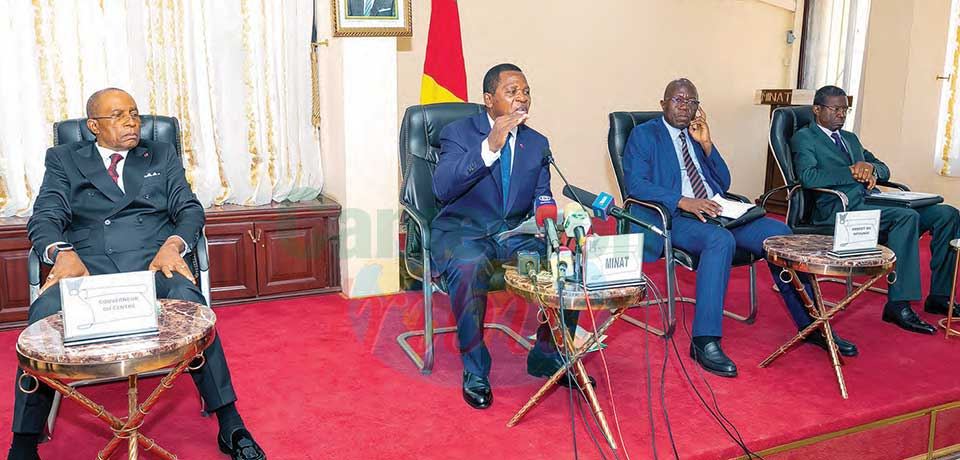
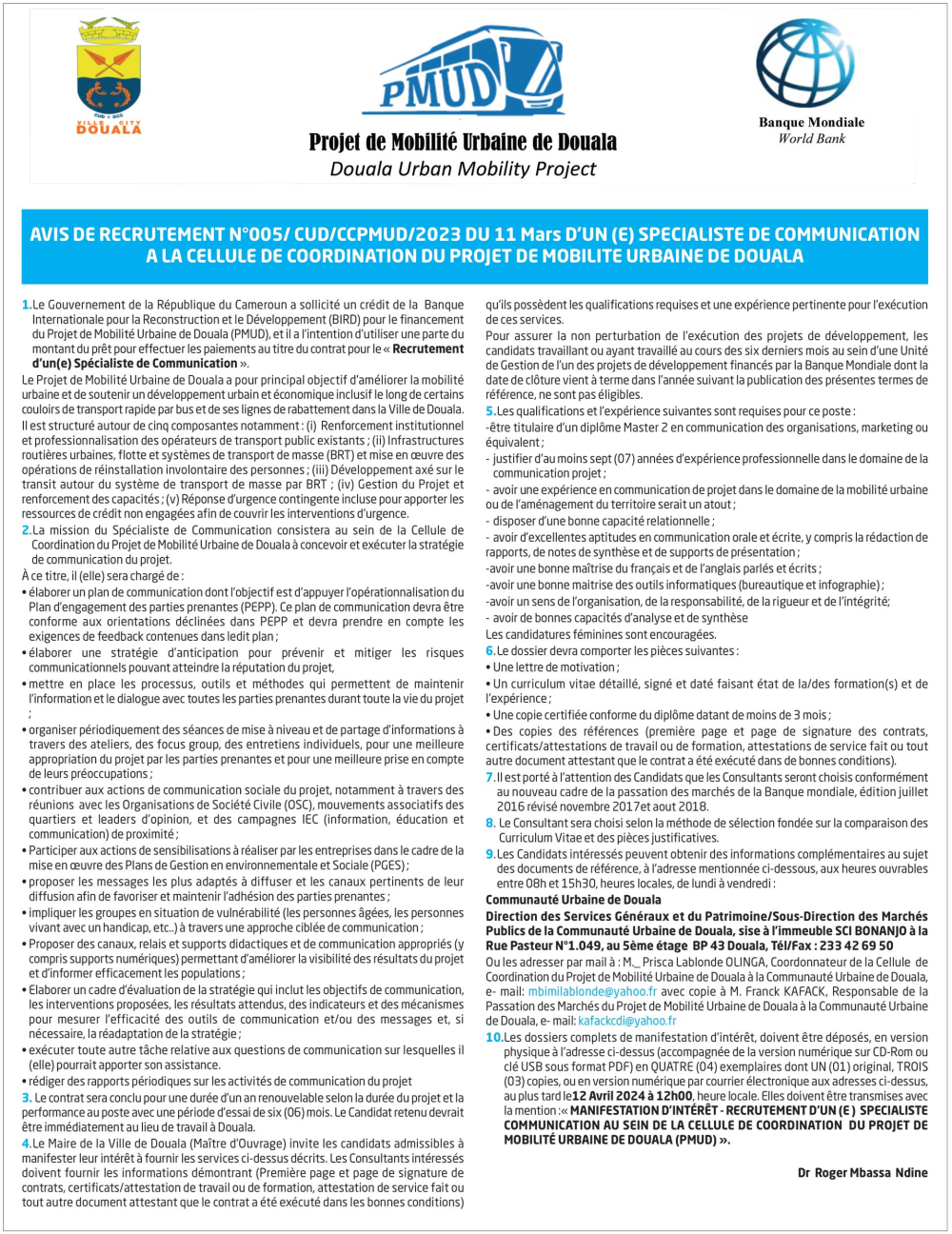
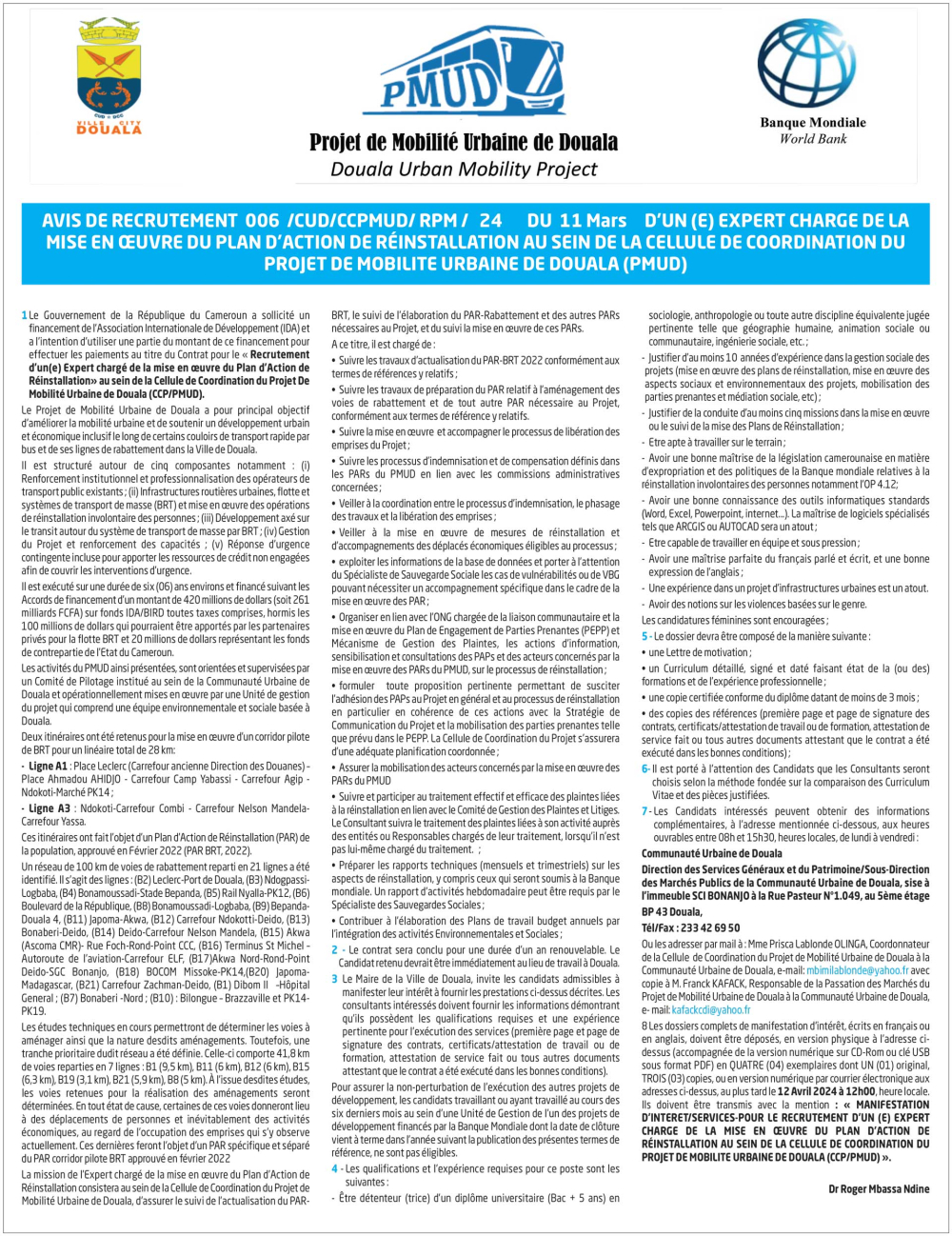
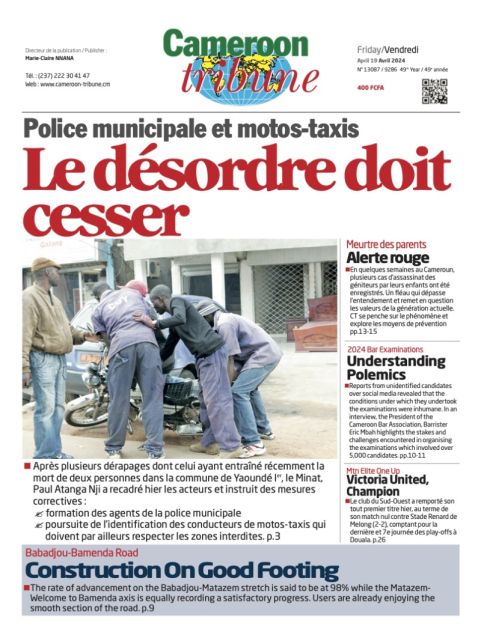




Commentaires